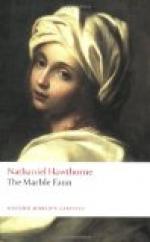“Well, then,” rejoined the sculptor, “see if there is any possibility of adapting yourself to my scheme. The incidents of a journey often fling people together in the oddest and therefore the most natural way. Supposing you were to find yourself on the same route, a reunion with Donatello might ensue, and Providence have a larger hand in it than either of us.”
“It is not a hopeful plan,” said Miriam, shaking her head, after a moment’s thought; “yet I will not reject it without a trial. Only in case it fail, here is a resolution to which I bind myself, come what come may! You know the bronze statue of Pope Julius in the great square of Perugia? I remember standing in the shadow of that statue one sunny noontime, and being impressed by its paternal aspect, and fancying that a blessing fell upon me from its outstretched hand. Ever since, I have had a superstition, you will call it foolish, but sad and ill-fated persons always dream such things,—that, if I waited long enough in that same spot, some good event would come to pass. Well, my friend, precisely a fortnight after you begin your tour,—unless we sooner meet,—bring Donatello, at noon, to the base of the statue. You will find me there!”
Kenyon assented to the proposed arrangement, and, after some conversation respecting his contemplated line of travel, prepared to take his leave. As he met Miriam’s eyes, in bidding farewell, he was surprised at the new, tender gladness that beamed out of them, and at the appearance of health and bloom, which, in this little while, had overspread her face.’
“May I tell you, Miriam,” said he, smiling, “that you are still as beautiful as ever?”
“You have a right to notice it,” she replied, “for, if it be so, my faded bloom has been revived by the hopes you give me. Do you, then, think me beautiful? I rejoice, most truly. Beauty—if I possess it—shall be one of the instruments by which I will try to educate and elevate him, to whose good I solely dedicate myself.”
The sculptor had nearly reached the door, when, hearing her call him, he turned back, and beheld Miriam still standing where he had left her, in the magnificent hall which seemed only a fit setting for her beauty. She beckoned him to return.
“You are a man of refined taste,” said she; “more than that,—a man of delicate sensibility. Now tell me frankly, and on your honor! Have I not shocked you many times during this interview by my betrayal of woman’s cause, my lack of feminine modesty, my reckless, passionate, most indecorous avowal, that I live only in the life of one who, perhaps, scorns and shudders at me?”
Thus adjured, however difficult the point to which she brought him, the sculptor was not a man to swerve aside from the simple truth.
“Miriam,” replied he, “you exaggerate the impression made upon my mind; but it has been painful, and somewhat of the character which you suppose.”




